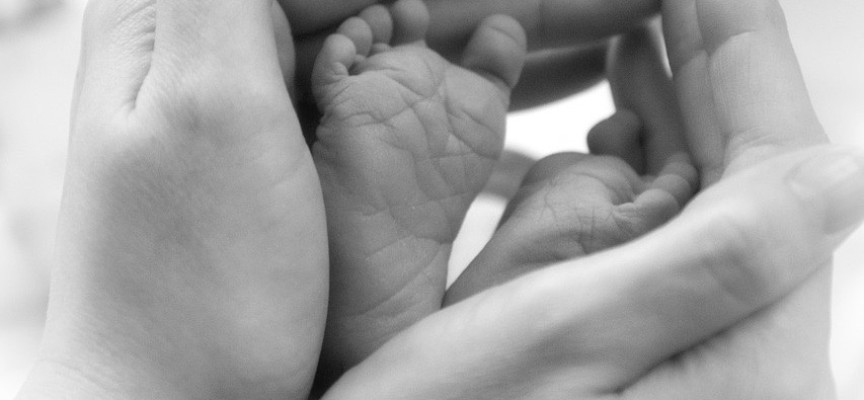
by Brent Prentice | Mar 22, 2018
When my wife and I became new parents, we were ultra-protective of our son – to a fault in many instances. It was obvious to us that no one could take better care of the little guy than we could.
It’s hard not to make idols out of ourselves as parents, and it’s hard not to idolize our children. One of the solutions to parenting idolatry is to trust God by trusting our brothers and sisters who are also indwelt by the Holy Spirit and desire to serve us as a part of the local church. After all, if you can’t trust your church family, who can you trust?
But this is the major sticking point isn’t it? Can other people be trusted with our most important possession(s)?
A personal story might connect.
I remember dropping our firstborn off at the nursery of the local church we called our faith family. The teenager who greeted us at the door – if you would call it a greeting – did not inspire much confidence. Of course, there were other and more seasoned folks in the room, but if a foot is to be put forward, shouldn’t it be the best foot? The young man meant well, but meaning well isn’t a whole lot of comfort to young and nervous parents. We needed someone to be a minister of assurance. We needed to see that we could trust others with our pride and joy.
If you are a parent with a pulse, you have probably experienced the same thing, and the thing that you most desired was to be assured that your child was in good hands. One of the most important ministries that any local church has is the ministry of assurance to parents as a part of the children’s ministry.
What then should be the attitudes and actions that would give assurance to parents that their children are safe and secure from harm?
- Parent Perspective. The children’s ministry is also a first impressions ministry to parents. We are not just taking care of someone’s kid, but we are ministering to the parent by partnering with them to love and disciple their child.
- Courtesy. The parent should be acknowledged with eye contact and a verbal greeting that is warm and reassuring. If possible, the worker/teacher would do well to walk to the door to receive the child and address the parent.
- The Attitude of Jesus. The parent should observe the worker/teacher greet the child in a warm and loving way. Did not Jesus model for us the way we ought to treat the little children (Matt. 19:13-15)? In our church, one of our expectations is that we will treat our youngest and oldest with special honor (1 Cor. 12:22-26).
- Communicate. Upon pick-up, the worker/teacher should communicate what the child did and how they did. Parents often want to know how and what their child is doing.
- Respect. Especially in the nursery, the worker/teacher should honor the nap and feeding schedule of the parent.
- Punctuality and Dependability. It’s important to be early because when parent(s) and child arrive before the worker/teacher, it communicates something. People keep commitments that they value, and time is a reference point for commitments. Additionally, when someone doesn’t show up, it causes scrambling, and scrambling doesn’t produce assurance.
- Think About Yourself. Jesus shows His genius when He tells His disciples in Matt. 7:12: “In everything (including children’s ministry), therefore, treat people (parents and children) the same way you want them to treat you.” We all want to be treated well, and if we took the words of Jesus to heart, we would surely do all of the above, because that’s the way we would want to be treated.
- Consider God’s Glory. We must always be asking if our actions and attitudes glorify God through Jesus (1 Cor. 10:31).
- Memorize Gal. 6:9. Ministry is hardly ever convenient and easy, but it can presently be worth it and will certainly be worth it one day. “Let us not lose heart in doing good, for in due time we will reap if we do not grow weary.”
If we would examine our hearts in light of these attitudes and actions, our children’s ministry would be good for worker, parent and child. May God give us the strength to love and minster to parent and child with all of our being. In doing so, we will also be loving Jesus (Matt. 22:36-40 and John 14:15).

by Brent Prentice | May 10, 2017
We have all said it and heard it: “I’m Sorry.”
But is this common statement enough? Is saying, “I’m sorry” a real apology?
Does it truly resolve conflict and foster healthy relationships?
I often ask in premarital counseling why it isn’t enough to say: “I’m sorry.” Most people have never even thought about it. They simply do it because that is what they have seen modeled.
After all, what does it mean when someone offers “I’m sorry” as an apology? Here’s what it could mean:
- I’m sorry you feel bad.
- I’m sorry I feel bad because you feel bad.
- I’m sorry I got caught.
- I’m sorry this is awkward.
- I’m a sorry human being, and I know it, and you should too.
- I’m sorry I wronged you, and I feel bad that I hurt you.
The fact is, a person could feel bad for a number of reasons and still not truly apologize and seek reconciliation for what they have done.
“I’m sorry” is a good first action, but it isn’t enough.
So what is enough? What is a healthy apology?
First, you have to mean it. People know when we really mean what we say, and more importantly God, knows when we mean it. So don’t say something just to alleviate a situation. Typically people who mean it will show it by their actions afterward, because if they are truly sorry they will take action to avoid further injury to the relationship. So mean it and determine to live like you mean it.
Second, say you are sorry, but make sure you your expression of sorrow is for the right reason. When you say I am sorry I hope you mean: “I am hurting because I hurt you.” Or, “I feel bad because I hurt you.” However, avoid the politician apology where you say: “I’m sorry if I hurt you or offended you.” Wrong! That means you are sorry someone is upset or mad and it probably doesn’t mean you are sorry that you wronged them. When you say you are sorry, make sure it is because you feel remorse that you hurt them.
Third, say why you are sorry. State specifically what you think you have done wrong. This enables both you and the offended person to agree on the specifics of the offense. This will help the person you hurt to know that you understand why they are hurt. If you have misidentified the hurtful action, then the person can correct you so you don’t keep making the same mistake again and again.
Finally, ask the wounded person: “Will you forgive me?” This is missing in too many apologies. Doing this is important because it shows that you know you need to be forgiven. It shows humility and sincere vulnerability to ask for forgiveness and that can be disarming.
Additionally, it allows the hurt person to own the process of reconciliation with their response. If the person won’t forgive you, then you know you both have more work to do. But if they say they forgive you, it provides a sense that a resolution has been reached, and you can begin to make sure the hurtful action does not happen again.
Without this question there is no way of knowing if both parties are satisfied with the outcome of the conversation. You need to have some certainty that you have done everything you can to make the wrong right, so you can begin to work on preventing the wrong the next time – if there is a next time.
So here is a healthy apology: “I’m sorry that I ______________________ (articulate the specific offense). Will you forgive me?”
This is how my wife and I and our children apologize to each other. It is the way I teach engaged couples to apologize. I believe this is the kind of apology that best brings about resolution in conflict and produces sanctification for God’s glory.
It’s a lot harder than a simple: “I’m sorry.” But it is the most fruitful apology method I have come across when it comes to truly resolving conflict.

by Brent Prentice | Apr 15, 2017
Why can’t you overcome that sin that you keep sinning?
You know, that secret sin, or not-so-secret sin, that always seems to trip you up and causes regret, anguish and despair? The one that you know is wrong, but you always seem to bow to anyway? The one that tracks you and pursues you? The sin about which you have the thought: If only I could just conquer this one particular sin, then I would be good.
How can victory be had over that nagging, leeching, life-sucking sin, and for that matter, other sins?
I wouldn’t be writing this if there were an easy answer. The Bible has a lot to say about this and we must hear and apply all the Spirit-inspired help the Bible has to offer. For sin is deadly and eternally serious. The cross teaches us that. If you don’t think your sin is life and death serious, then you don’t understand the cross and the meaning of what Jesus showed us and did for us. It’s that simple. And we must learn to employ the powerful Passion of the Christ and His Cross if we have any hope of progressively having victory over sin in our lives.
Have you considered how the cross might be used in your ongoing fight against sin?
Think about just a few of the physical, mental, social, emotional and spiritual abuses Jesus endured in his final hours on the earth He created (John 1:1-3):
- (Mark 13:36) Jesus agonized spiritually and emotionally in Gethsemane over His imminent sacrifice.
- (Mark 14:50) He was abandoned by all of His disciples – “And they all left Him and fled.”
- (Mark 14:65) He was punched, slapped and taunted by His own (John 1:11).
- (Mark 14:66-27) He was denied by Peter three times, and this despite the fact that He warned Peter (14:30).
- (Mark 15:1-3) He was lied about and called an insurrectionist – “The King of the Jews”.
- (Mark 15:15) He was used as a political pawn and bargaining chip, and substituted for the convicted murderer and criminal Barabbas, and was scourged. It is necessary to describe the scourging (flogging) that preceded crucifixion to fully understand how much Jesus endured physically. “The prisoner was stripped, bound to a post or pillar, or sometimes simply thrown to the ground, and was beaten by a number of guards until his flesh hung in bleeding shreds. The flagellum consisted of leather thongs plaited with several pieces of bone or lead so as to form a chain. Men who were beaten in this way often collapsed and died by flogging. In some instances, the scouring would expose the entrails and on one occasion, reported by Josephus, the bones of a man were exposed.” (Sources: Danny Akin and William Lane) The beating could be so severe, that some prisoners died from shock before they ever made it to the cross.
- (Mark 15:16-21) He was mocked, physically abused with a crown of thorns pressed down on his head and with a wooden rod.
- (Mark 15:21) He is so physically spent that he can’t carry the traverse beam of the cross to His own death as the soldiers parade Him through the city as a public spectacle, warning all who see that no one crosses Rome.
- (Mark 15:24) And finally “they crucified Him.” That’s all Mark says. Why doesn’t Mark tell us how horrible the cross is? He doesn’t have to tell the Roman Christians that he is writing to because it is a common feature of the ancient world. Mark’s audience knew how horrible it was, but we really don’t. Jesus now hangs, and likely naked, on the ‘slave’s wood’, a ‘criminal’s tree’, a ‘sign of shame’, the ‘infamous stake’, the ‘barren wood’, the ‘terrible cross’ and ‘the most wretched of deaths’, according to Josephus. He was positioned on a hill outside the city wall and was lifted high on a stake so that all would see that He was guilty of high treason (Mark 15:26), and He was executed between two convicted criminals who mock and insult Him (15:27 and 32). While He hangs, battered, exposed and gasping for air, He was continually mocked, ridiculed and maligned repeatedly – even by strangers (15:29).
God ordained that Jesus would come at this time in history, to be executed by the method of the cross. Why? couldn’t Jesus have come at another time and been executed by firing squad, electric chair or lethal injection?
There is surely more than one answer to this question, but there is an answer that will help us in our fight against sin. There is something useful for the everyday fight for sanctification in the punishment that Jesus endured to bring us peace (Isaiah 53:5).
Here it is: THE CROSS SHOWS US HOW SERIOUS SIN IS – IT IS DEADLY SERIOUS. It is grotesquely serious. It is crushingly serious. It is wrathfully serious. It causes injustice that must be dealt with by justice – and Jesus took it for God’s glory and for the ransom of many (Mark 10:45).
So the next time you are hounded by “that sin” and you are harassed by your own fleshly desires, and caving to it feels inevitable, fight and wage war on it by dwelling on the Passion of the Christ and all He endured for you. Develop a mental sensory narrative in your mind that you can play in the moment of temptation. Hear the insults that Christ endured on the day of His death. See the blows and the blood. Put yourself in the place of those who were there. Remember that your sin was there and that you share the responsibility of the cross. Read chapters 14 and 15 of Mark and buy Martin Hengel’s book Crucifixion to study and learn about the details of scourging and crucifixion, and think on the crowd and remember that He bore your sin in His body on the cross, so that you might die to sin and live to righteousness (1 Peter 2:24).
Learn to fight present sin with the finished work of the cross.

by Brent Prentice | Mar 2, 2017
“Pay close attention to yourself and to your teaching; persevere in these things, for as you do this you will ensure the salvation both of yourself and for those who hear you” (1 Tim. 4:16).
The Shack is set to be released as a movie on March 3. The book version of this fictional theodicy (why an all-powerful and good god allows evil and pain) has been wildly popular. It has sold somewhere in the neighborhood of 20 million copies and has been translated into 50 languages. It is on the all-time top 100 list for works of fiction, and at one point it spent 49 weeks in a row on the New York Times bestseller list at #1.
The bottom line is this: Because of its popularity, it is very likely many people in our churches, those who work with us and many of our neighbors will watch this movie. This presents both an opportunity for conversations about the God of the Bible, but it also could be used as a tool of the enemy to distract and deceive. Are you and those you know ready for The Shack? Because The Shack is back.
In 2010, two very popular and well-respected leaders among evangelical Christians posted blogs, raising various concerns about the widely popular book. Tim Keller, on the Gospel Coalition Blog gave some impressions from his reading of the book but mostly devoted his words to expressing “strong concerns”.
Keller said, “However, sprinkled throughout the book, Young’s (the author) story undermines a number of traditional Christian doctrines. Many have gotten involved in debates about Young’s theological beliefs, and I have my own strong concerns. But here is my main problem with the book. Anyone who is strongly influenced by the imaginative world of The Shack will be totally unprepared for the far more multi-dimensional and complex God that you actually meet when you read the Bible.”
In his blog, Albert Mohler develops more thoroughly several of the theological problems the fictional book transmits. Then at the conclusion of his article he wrote:
“In evaluating the book, it must be kept in mind that The Shack is a work of fiction. But it is also a sustained theological argument, and this simply cannot be denied. Any number of notable novels and works of literature have contained aberrant theology, and even heresy. The crucial question is whether the aberrant doctrines are features of the story or the message of the work. When it comes to The Shack, the really troubling fact is that so many readers are drawn to the theological message of the book and fail to see how it conflicts with the Bible at so many crucial points.”
Mohler continued, “All this reveals a disastrous failure of evangelical discernment. It is hard not to conclude that theological discernment is now a lost art among American evangelicals — and this loss can only lead to theological catastrophe.”
And this is exactly my concern and experience with The Shack. Yes it is fiction, but because it resonates with people by helping them deal with the issue of past offenses and forgiveness, they also seem to forget that the triune god, which is portrayed in the book, is clearly not the Triune God of the Bible. The potential result is that people will love the god of The Shack and not the God of the Bible. In not discerning the errors of the book, a god has been created that does not exist, or better yet an idol has been fashioned.
I acknowledge that many people in this broken world have had disappointing father figures and that they therefore project the poor example of those fathers toward our Heavenly Father. But that doesn’t mean that our Heavenly Father is like our earthly fathers, and it doesn’t mean we can quit calling Him Father. If we can say God is mother, what is to keep us from identifying god as tree, cat or dog?
The concerns raised by Keller and Mohler are both legitimate, and I wonder whether or not most Christians can read a popular book of fiction like The Shack and discern through the lens of the Bible, as opposed to emotional need, whether the book is simply an entertaining read or whether the idea of god it espouses is the God of the Bible. Echoing Mohler, what does it say about Christianity, and additionally a lot of our preaching and teaching efforts that so many people can’t discern the biblical God from the god of The Shack? What does it say that they prefer the god of The Shack to the God of the Bible? What does it mean that a person would allow their emotions to dictate their view of God? Emotions are important in the life of a Christian, but they are no sure guide for making decisions in a broken world.
Biblically speaking, this popular book raises many questions that I fear will only give us unbiblical answers. I don’t mean to demonize The Shack as though it were only good for kindling on a cold day. I am not saying don’t read it. I am not calling for a boycott of the movie. But should we not at least test the spirits to see whether they are from God (1 John 4:1), or whether they are as potentially dangerous as some have warned.
Until we know the God of the Bible and learn to love the God of the Bible with all of our heart and mind, however difficult we may find both, The Shack, or another book like it will keep coming back, and many people will believe in the god of that book too.

by Brent Prentice | Jul 30, 2015
Unless you have been stranded on a desert island or have put your head in the sand, you know that, in recent weeks, several videos have been released to the public, showing Planned Parenthood doctors and undercover pro-life activists discussing the procedure of abortion. In the videos, the doctors explain how an abortion can carefully be done to harvest undamaged organ and muscle “specimens” so they can be sold for research.
Watching the videos, especially the third, stirs within me a tsunami of thoughts and emotions. Honestly, I can’t convey them succinctly, not only because there are so many, but additionally, there is an inner conflict and tension.
On the one hand, as long as Planned Parenthood is providing abortion, I want them to be defunded. I feel disgust and anger that people can be so cruel and calloused toward unborn and defenseless persons – both little girls and boys. Don’t these pro-destruction doctors know they are killing a human person? Hasn’t it occurred to them that they also were once in the womb and defenselessly vulnerable? In the name of women’s health and reproductive rights, can’t they see they are hurting women and killing little girls? Anyone who is willing to honestly look at an ultrasound, knows the life in the womb is a human being with all the capacity to become a functioning person. Don’t they have eyes to see? Abortion is wrong! It is unjust! It is immoral! Defund Planned Parenthood!
On the other hand, I feel pity for those who make abortion possible, and I have deep empathy for hurting women who feel trapped, hopeless and scared, seeing no other option than to surrender their body and baby to a procedure that hurts and destroys life. I want to do more than condemn! I want people to change their minds! I want to help! I want to give hope!
It is right and just to be against abortion, but it’s not enough just to be against something, we must also be for something. We must be for people, and if we are for people, we must do something to help people. We must do more than defund Planned Parenthood.
What then can we do? What can you do? It is such a massive problem, and we have so little control over laws and the personal decisions people make.
The answer is simple. With God’s energy and strength, we must do what we can – with what we have – where we are. Doing nothing is doing something, and it is the worst something we can do.
To begin with, anyone claiming Christ must constantly preach to themselves that they are sinner and rebel in need of the grace of God through Jesus Christ. Unless we start here, we will run into the ditch of self-righteousness, and instead of being a part of the solution, we will only be willing to condemn. That doesn’t help anyone. We must do more than point out what is wrong; we must declare to ourselves and others that we all need the righteousness of God through faith in Christ alone. We must be continuously humbled and motivated by our sinful condition and God’s amazing grace.
But we must also put actions to our faith and join those who are already making a difference to help mothers, fathers and unborn babies. Have you thought about partnering with a crisis pregnancy center in your city or town? Have you offered to serve or mentor hurting men and women? Have you contributed financially? Have you donated diapers, baby bedding, clothes and other items? Have you considered adoption or becoming a foster-parent? If there is not a crisis pregnancy center where you live, have you prayed about starting one? Besides being against abortion vocally and politically, what have you done to help?
We must support and stand with the hurting. If we as Christians won’t help those who are hurting, organizations like Planned Parenthood will fill the void. In recent weeks, we have seen how they help. We can offer something better, but we must love people more.




